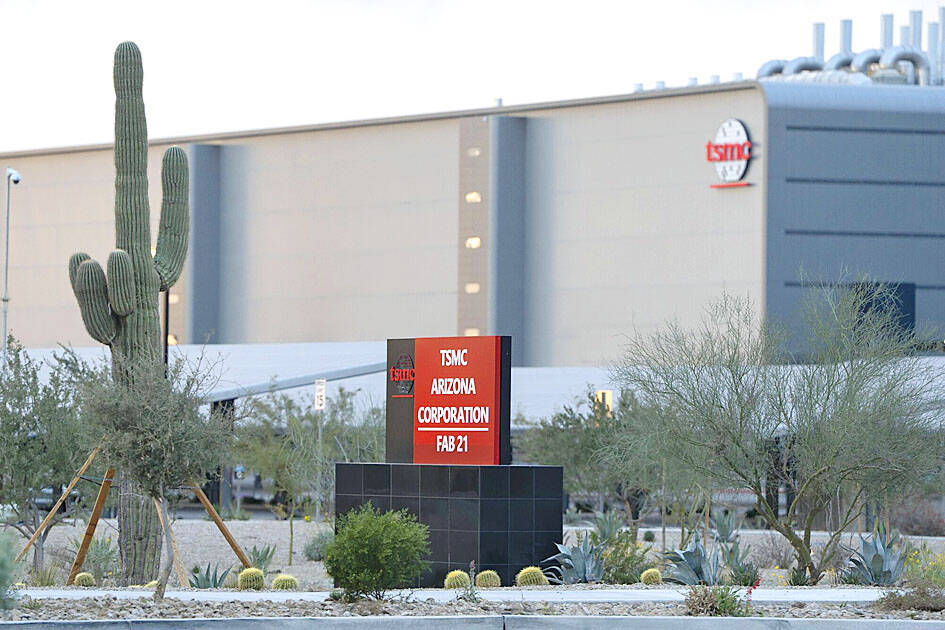Softbank Group Corp founder Masayoshi Son is seeking to team up with Taiwan Semiconductor Manufacturing Co (TSMC, 台積電) to realize what could be his biggest bet yet — a trillion-dollar industrial complex in Arizona to build artificial intelligence (AI)-powered robots.
Son envisions a version of the vast manufacturing hub of China’s Shenzhen that would bring back high-tech manufacturing to the US, according to people familiar with the billionaire’s thinking.
The park could comprise of production lines for AI-powered industrial robots, they said, asking not to be named as the plan remains private.

Photo: Bloomberg
Softbank officials are keen to have the Taiwanese maker of Nvidia Corp’s advanced AI chips play a prominent role in the project, although it is not clear what part Son sees for TSMC, which already plans to invest US$165 billion in the US and has started mass production at its first Arizona factory. Nor is it clear that TSMC would be interested.
A person familiar with the chipmaker’s thinking said that Softbank’s project has no bearing on TSMC’s plans in Arizona.
Codenamed “Project Crystal Land,” the Arizona complex represents the 67-year-old Softbank founder’s most ambitious attempt in a career that has spanned numerous bet-the-house bids, thousands-fold-returns and billions of dollars of losses. Son, who has often expressed disappointment in his own legacy, has repeatedly said he means to do everything he can to speed up AI development.
Softbank officials have spoken with federal and state government officials to discuss possible tax breaks for companies building factories or otherwise investing in the industrial park, including talks with US Secretary of Commerce Howard Lutnick, the people said.
The Japanese billionaire is also personally sounding out interest among an array of technology companies, they said. The project has been floated to executives at South Korea’s Samsung Electronics Co, they said.
Son has pulled together a list of Softbank Vision Fund portfolio companies that might take part in the Arizona manufacturing hub, the people said.
Softbank-backed start-ups working on robotics and automation technologies — such as Agile Robots SE — could set up production facilities at the industrial complex, they said.
The plans are preliminary and feasibility hinges on support from the administration of US President Donald Trump and state officials. While the cost of the project as envisioned by Son could require as much as US$1 trillion to execute, the actual scale depends on interest from big technology companies. If successful, Son has floated building multiple cutting-edge parks across the US.

CHIP RACE: Three years of overbroad export controls drove foreign competitors to pursue their own AI chips, and ‘cost US taxpayers billions of dollars,’ Nvidia said China has figured out the US strategy for allowing it to buy Nvidia Corp’s H200s and is rejecting the artificial intelligence (AI) chip in favor of domestically developed semiconductors, White House AI adviser David Sacks said, citing news reports. US President Donald Trump on Monday said that he would allow shipments of Nvidia’s H200 chips to China, part of an administration effort backed by Sacks to challenge Chinese tech champions such as Huawei Technologies Co (華為) by bringing US competition to their home market. On Friday, Sacks signaled that he was uncertain about whether that approach would work. “They’re rejecting our chips,” Sacks

Taiwan’s exports soared 56 percent year-on-year to an all-time high of US$64.05 billion last month, propelled by surging global demand for artificial intelligence (AI), high-performance computing and cloud service infrastructure, the Ministry of Finance said yesterday. Department of Statistics Director-General Beatrice Tsai (蔡美娜) called the figure an unexpected upside surprise, citing a wave of technology orders from overseas customers alongside the usual year-end shopping season for technology products. Growth is likely to remain strong this month, she said, projecting a 40 percent to 45 percent expansion on an annual basis. The outperformance could prompt the Directorate-General of Budget, Accounting and

NATIONAL SECURITY: Intel’s testing of ACM tools despite US government control ‘highlights egregious gaps in US technology protection policies,’ a former official said Chipmaker Intel Corp has tested chipmaking tools this year from a toolmaker with deep roots in China and two overseas units that were targeted by US sanctions, according to two sources with direct knowledge of the matter. Intel, which fended off calls for its CEO’s resignation from US President Donald Trump in August over his alleged ties to China, got the tools from ACM Research Inc, a Fremont, California-based producer of chipmaking equipment. Two of ACM’s units, based in Shanghai and South Korea, were among a number of firms barred last year from receiving US technology over claims they have

BARRIERS: Gudeng’s chairman said it was unlikely that the US could replicate Taiwan’s science parks in Arizona, given its strict immigration policies and cultural differences Gudeng Precision Industrial Co (家登), which supplies wafer pods to the world’s major semiconductor firms, yesterday said it is in no rush to set up production in the US due to high costs. The company supplies its customers through a warehouse in Arizona jointly operated by TSS Holdings Ltd (德鑫控股), a joint holding of Gudeng and 17 Taiwanese firms in the semiconductor supply chain, including specialty plastic compounds producer Nytex Composites Co (耐特) and automated material handling system supplier Symtek Automation Asia Co (迅得). While the company has long been exploring the feasibility of setting up production in the US to address